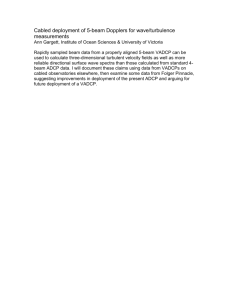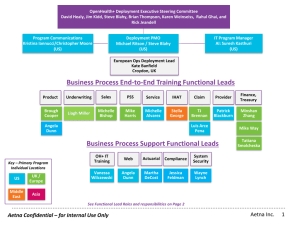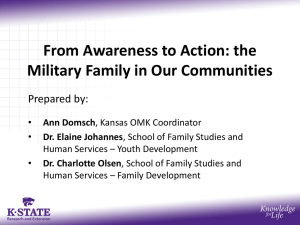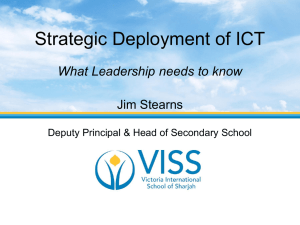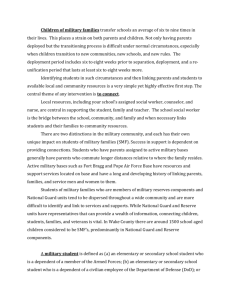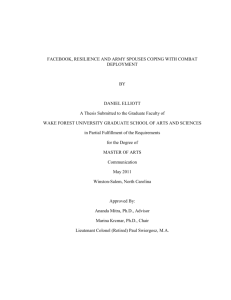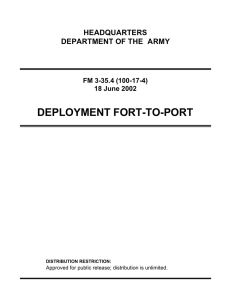Deployment Demonstration Programs
advertisement
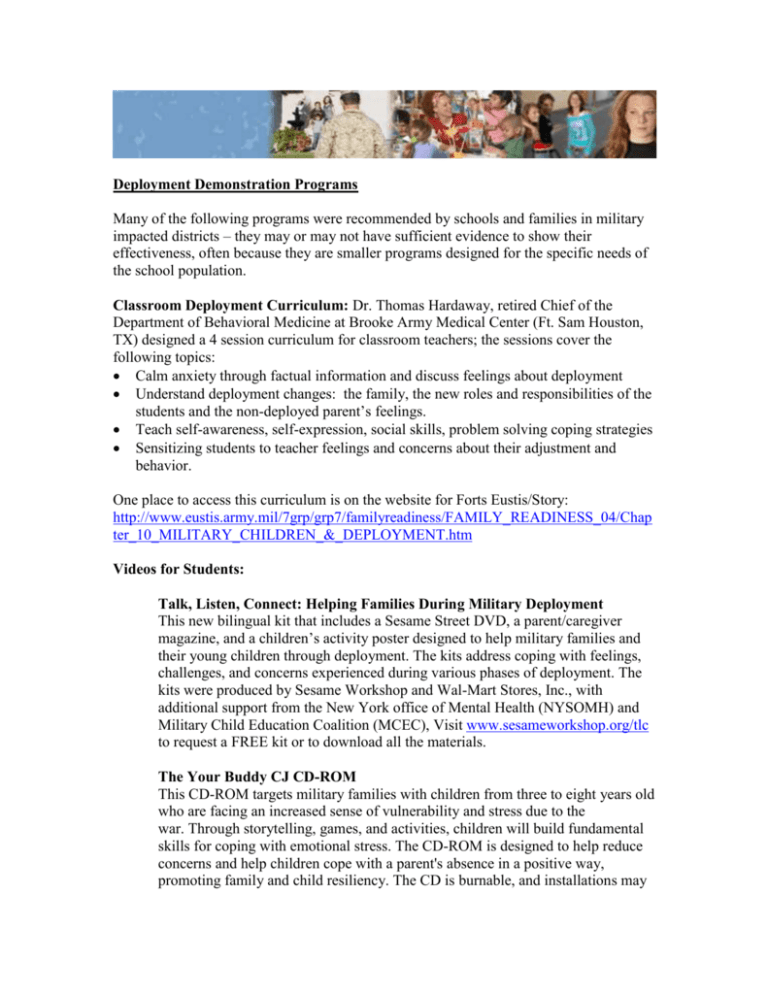
Deployment Demonstration Programs Many of the following programs were recommended by schools and families in military impacted districts – they may or may not have sufficient evidence to show their effectiveness, often because they are smaller programs designed for the specific needs of the school population. Classroom Deployment Curriculum: Dr. Thomas Hardaway, retired Chief of the Department of Behavioral Medicine at Brooke Army Medical Center (Ft. Sam Houston, TX) designed a 4 session curriculum for classroom teachers; the sessions cover the following topics: Calm anxiety through factual information and discuss feelings about deployment Understand deployment changes: the family, the new roles and responsibilities of the students and the non-deployed parent’s feelings. Teach self-awareness, self-expression, social skills, problem solving coping strategies Sensitizing students to teacher feelings and concerns about their adjustment and behavior. One place to access this curriculum is on the website for Forts Eustis/Story: http://www.eustis.army.mil/7grp/grp7/familyreadiness/FAMILY_READINESS_04/Chap ter_10_MILITARY_CHILDREN_&_DEPLOYMENT.htm Videos for Students: Talk, Listen, Connect: Helping Families During Military Deployment This new bilingual kit that includes a Sesame Street DVD, a parent/caregiver magazine, and a children’s activity poster designed to help military families and their young children through deployment. The kits address coping with feelings, challenges, and concerns experienced during various phases of deployment. The kits were produced by Sesame Workshop and Wal-Mart Stores, Inc., with additional support from the New York office of Mental Health (NYSOMH) and Military Child Education Coalition (MCEC), Visit www.sesameworkshop.org/tlc to request a FREE kit or to download all the materials. The Your Buddy CJ CD-ROM This CD-ROM targets military families with children from three to eight years old who are facing an increased sense of vulnerability and stress due to the war. Through storytelling, games, and activities, children will build fundamental skills for coping with emotional stress. The CD-ROM is designed to help reduce concerns and help children cope with a parent's absence in a positive way, promoting family and child resiliency. The CD is burnable, and installations may create as many copies as they like for continued distribution to service members and families. A program for older students, ages 6 – 12, is also being produced. Copies were distributed through Army Community Service (ACS) centers worldwide. Contact your local Army installation. “Mr. Po and Friends” and “Youth Coping with Separation: When Family Members Deploy” are short films available on the American Academy of Pediatrics website to assist students in coping with deployment. Mr. Po and Friends is geared towards elementary school children, while Youth Coping with Separation is directed at teens. In both, deployment fears, anxieties, and reactions are described. There are facilitator’s guides for teachers or other youth-serving personnel to help start group discussions and activities. For more information, see: www.aap.org/sections/unifserv/deployment/index.htm Kids on the Block This is a puppet program performed in DoDEA schools. The “Wait Till the War is Over” script addresses the difficulties that military families face when confronted with the reality of deployment. After the performance, students are encouraged to participate in a question and answer session with the puppets that provides students with an open forum to express their anxieties and fears about deployment. Learn more at www.kotb.com. 4-H (Operation Military Kids) 4-H is the largest voluntary co-educational youth program in the world, implemented in both rural and urban settings. The name reflects the motto: “My Head to clearer thinking; my Heart to greater loyalty; my Hands to larger services; and my Health to better living.” Community members act as supervisors, local teens act as mentors for younger students, and students participate in civic activities. In one school, the students’ project for the state fair was to create and produce an anti-drug skit, which the students enacted twice a day at the fair grounds. The program maintains a continuous evaluation system that focuses on both process and outcomes for the child, the family, and the community. A comparison of students’ performance prior to and after participation in the program indicated that 4-H participation significantly improved school attendance, school and home behavior, and grade point average and reduced illegal activities. In conjunction with other organizations, 4-H is involved in Operation: Military Kids to support children whose National Guard or Army Reserve parents are deployed. For more information visit: www.4husa.org Operation Purple Camps: The National Military Family Association has set up free summer camps for students with deployed parents aimed at increasing their support network and teaching coping strategies. A new program for students with injured parents was started for summer 2007. For more information and registration materials see: http://www.nmfa.org/site/PageServer?pagename=op_default?&from_www.operationpurple.org
